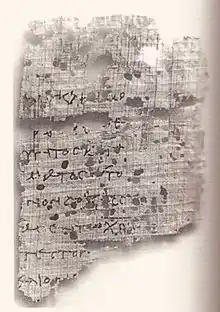Papyrus 92
Le papyrus 92 (dans la numérotation Gregory-Aland), désigné par le sigle 92, (PNarmuthis 69.39a/229a) est un ancien papyrus du Nouveau Testament[1].
Papyrus 92

| nom | P. Narmuthis 69.39a/229a |
|---|---|
| texte |
Épître aux Éphésiens 1:11-13,19-21 2 Thessaloniciens 1:4-5,11-12 |
| langue | Grec |
| date | env. 300 |
| trouvé | Oasis du Fayoum, Égypte |
| maintenant à | Musée égyptien du Caire, Égypte |
| citer | Claudio Galazzi, Frammenti di un codice con le Epistole de Paolo, ZPE 46 (1982), p. 117–122 |
| dimension | 14.5 x 21.5 cm |
| type | Texte de type alexandrin |
Description
Le texte se présente sur vingt-sept lignes par page[2].
Le texte grec de ce codex est représentatif des textes alexandrins. 92 est très similaire au 46, au Codex Sinaiticus, et au Vaticanus[3].
Il est actuellement détenu par le musée égyptien du Caire (Inv. 69,39a + 69,229a) au Caire[1] - [4].
Voir aussi
Bibliographie
- Claudio Galazzi, Frammenti di un codice con le Epistole de Paolo, Zeitschrift für Papyrologie und Epigraphik 46 (Bonn: 1982), p. 117–122.
Liens externes
- [chrles.multiply.com/photos/album/36/Bible_Papyrus_p92#2 Image from 92]
Notes et références
- Kurt Aland, Barbara Aland; Erroll F. Rhodes (trans.), The Text of the New Testament : An Introduction to the Critical Editions and to the Theory and Practice of Modern Textual Criticism, Grand Rapids, William B. Eerdmans Publishing Company, , 366 p. (ISBN 978-0-8028-4098-1, lire en ligne), p. 102, 159
- Philip W. Comfort et David P. Barrett, The Text of the Earliest New Testament Greek Manuscripts, Wheaton, Illinois, Tyndale House Publishers, , 625 p. (ISBN 978-0-8423-5265-9)
- Philip W. Comfort, Encountering the Manuscripts. An Introduction to New Testament Paleography & Textual Criticism, Nashville, Tennessee: Broadman & Holman Publishers, 2005, p. 74.
- « Liste Handschriften », Münster, Institute for New Testament Textual Research (consulté le )
- (en) Cet article est partiellement ou en totalité issu de l’article de Wikipédia en anglais intitulé « Papyrus 92 » (voir la liste des auteurs).
Cet article est issu de wikipedia. Text licence: CC BY-SA 4.0, Des conditions supplémentaires peuvent s’appliquer aux fichiers multimédias.
